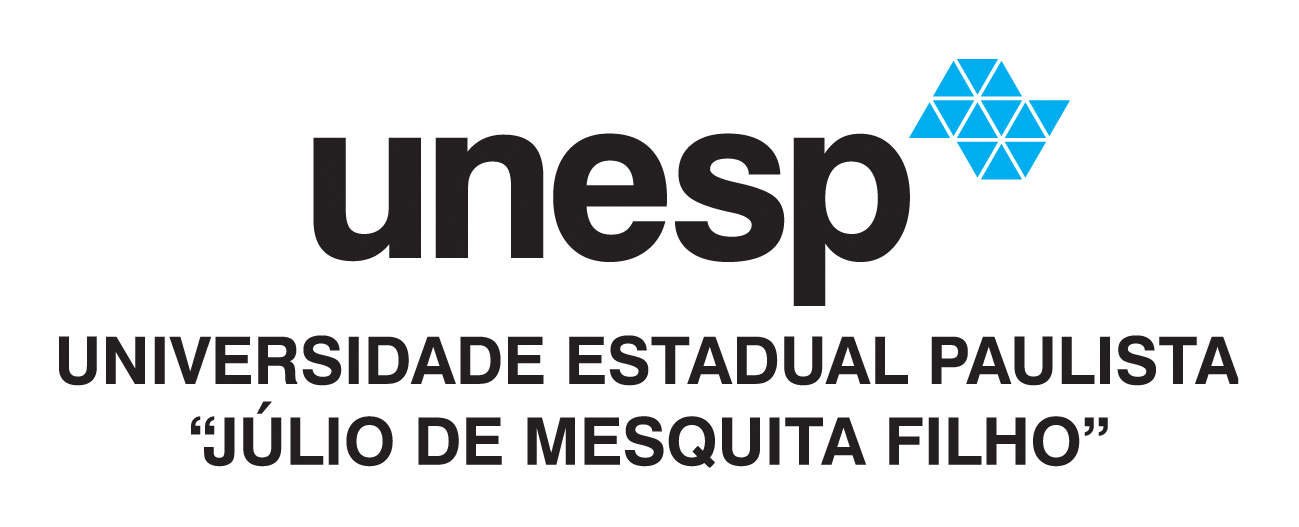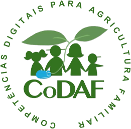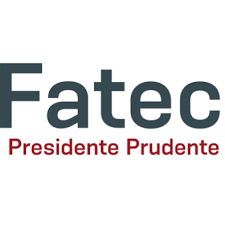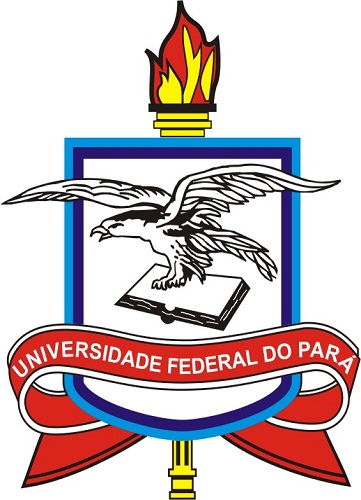e-CoDAF - Digital Skills for Family Farmers International Meeting
The International Meeting Digital Skills for Family Farming (e-CoDAF) is promoted by the Project Digital Skills for Family Farming (CoDAF). The event takes place annually, with the objective of presenting research and proposals on the development and use of Information and Communication Technologies (ICT) in rural areas, with emphasis on the context of small producers and those interested in the theme of Family Farming. The e-CoDAF is organized in partnership with higher education institutions and the works presented at the event are published in books and scientific magazines.
VII International Meeting Digital Skills for Family Farming
Digital technologies and sustainability in the rural field: the importance of data for rural development
The VII International Meeting of Digital Skills for Family Farming (VII e-CoDAF) addresses the theme 'Digital technologies and sustainability in the rural field: the importance of data for rural development'. This edition of the event is promoted by the CoDAF Project in collaboration with four higher education institutions (UNESP, FATEC, UFPA and UEL) and will have its program (lectures and presentations of articles) transmitted online through the Youtube Channel of the Technology Research Group Data Access (GPTAD). Approved papers will be published in book format, and the best will be indicated for publication in the Eletronic Journal Digital Skills for Family Farming (RECoDAF).
When?
The VII e-CoDAF will be held on November 6th, 2020, from 9 AM to 22 PM, local time.
Where?
The event will be held in online format with transmission on the Youtube Channel of the Data Access Technology Research Group (GPTAD).
How much?
The entrance is open, but you have to register.
How do I sign up?
Registration is free, but registration must be done for participation.
Paper Submission
Meeting Schedule
- Opening of Paper Submission: June, 19th 2020.
- Closing the Acceptance of Paper Submissions: September, 20th 2020 (the deadline will not be extended).
Submission Guidelines
- Thematic lines: 1. Approaches between small rural properties and the Digital World; 2. Data access process and sustainability in the field, and; 3. Data and information management and organization and small rural properties.
- The submitted articles must be unpublished as they will be submitted to a plagiarism detection tool.
- Submissions are accepted of articles in Portuguese, English and Spanish.
- If approved, the article will be published in the form of an eBook with ISBN and the best articles will be indicated for publication in the Revista Competências Digitais para Familiar Familiar (RECoDAF). < / li>
- The article must have a minimum of 10 and a maximum of 15 pages, including, within this limit, the title, the abstract, the abstract in a foreign language, the content sections, references, appendices and annexes.
- The pages must be A4 size, with margins of 3 centimeters (top and left) and 2 centimeters (bottom and right).
- All hyperlinks in the article must be active and referenced.
- Articles must adopt the formats and styles of ABNT - Brazilian Association of Technical Standards.
- Contributions are free of structure, however it is mandatory: I- Title of the work in Portuguese and English; II- Abstract and Abstract; III- Keywords (not less than 3, not more than 5); and IV- Bibliography and citations according to the citation style and bibliography standard of the Brazilian Association of Technical Standards - ABNT.
- ODT, DOC, DOCX or RTF file formats are accepted.
- PDF formats will not be accepted.
Submission Process
- The paper should be submitted as an attachment and sent by e-mail to the address codaf@tupa.unesp.br.
- In addition to attaching the paper, information about all authors must be included in the message:
- Full Name
- Social Number ID
- The last academic title, area, and university (Example: Doctor of Information Science - São Paulo State University)
- The current institutional link
- All other communications will be sent by email.
Presentation of the article by video conference.
The Accepted articles will have their presentation disciplined by the following criteria.
Criteria for recording and sending the presentation video:
- Maximum presentation time: 10 minutes;
- During recording keep in the center of the video;
- Preferably use the clean background (light colored wall, without showing objects);
- In cases where the recording is made with a cell phone, keep the horizontal device;
- Make sure the sound capture was adequate;
- Remember to open your video with a brief presentation of the event for which it is intended and the authors involved ;
- In the conclusion or in the notes (from YouTube itself) it is recommended to include ways of contacting the authors;
- Make the video available online on YouTube and forward the hyperlink to the Scientific Committee (fabio.moreira@unesp.br) with the following data:
- The access hyperlink;
- Title of the Presentation;
- Description of the video (up to 200 words ); < li> Presentation Title (English);
- Description of the video (up to 200 words) (English).
Schedule
Período Matutino - Manhã
- 09:30 - 10:00: Cerimônia de Abertura
- 10:00 - 11:00: Palestra: O conceito de dados FAIR e sua aplicação nos dados agropecuários - Profa. Dra. Paloma Marín Arraiza
- 11:00 - 12:00: Palestra: Identidade digital e competências digitais no contexto da Agricultura Familiar - Profa. Dra. Sara Martínez Cardama
- 12:00 - 14:00: Pausa para Almoço
Período Vespertino - Tarde
- 14:00 - 15:00: Palestra: Transparência nas cadeias globais de valor e a sustentabilidade no campo - Profa. Dra. Patrícia Prado
- 15:00 - 16:00: Palestra
- 16:00 - 18:00: Apresentação de trabalhos
- 18:00 - 18h30: Cerimônia de encerramento
Post-conference
Soon
Paper presentations
| Time | Place | Title | Authors |
|---|---|---|---|
| Time | Place | Title | Authors |
Expedient
Organizing Committee
- Cristian Berrío-Zapata, UFPA - Federal University of Pará
- Daiane Marcela Piccolo, FATEC - São Paulo State Technological College
- Jacquelin Camperos Reyes, UNESP - São Paulo State University
- Ricardo César Gonçalves Sant'Ana, UNESP - São Paulo State University
Scientific Committee
- Adriane Cavichiolli, FATEC - São Paulo Technology College
- Cristiane Hengler Bernardo, UNESP - São Paulo State University
- Daiane Marcela Piccolo, FATEC - São Paulo Technology College
- Diana Vilas Boas Souto Aleixo, UNESP - São Paulo State University
- Elaine Parra Afonso, FATEC - São Paulo Technology College
- Elias Gilberto Djive, UFSM - Santa Maria Federal University
- Evandro Pereira Prado, UNESP - São Paulo State University
- Fábio Mosso Moreira, UNESP - São Paulo State University
- Felipe Augusto Arakaki, UnB - University of Brasilia
- Fernando de Assis Rodrigues, UFPA - Federal University of Pará
- Ilidio Lobato E. Manhique, UNESP - São Paulo State University
- Jacquelin Camperos Reyes, UNESP - São Paulo State University
- Juliana Correa Bernardes, UEL - Londrina State University
- Liliana Giusti Serra, UNESP - São Paulo State University
- Marina Funichello, FATEC - São Paulo Technology College
- Mirelys Puerta Díaz, UNESP - São Paulo State University
- Pedro Henrique Santos Bisi, UNESP - São Paulo State University
- Roberta Carolina Vesu Alves, UNESP - São Paulo State University
- Silvia Cristina Vieira, COATER, Cooperativa de Assessoria Técnica e Extensão Rura
General Support Committee
- Diana Vilas Boas Souto Aleixo, UNESP - São Paulo State University
- Elaine Parra Afonso, FATEC - São Paulo Technology College
- Elizabete Cristina de Souza de Aguiar Monteiro, UNESP - São Paulo State University
- Ester Ferreira da Silva, UFPA - Federal University of Pará




